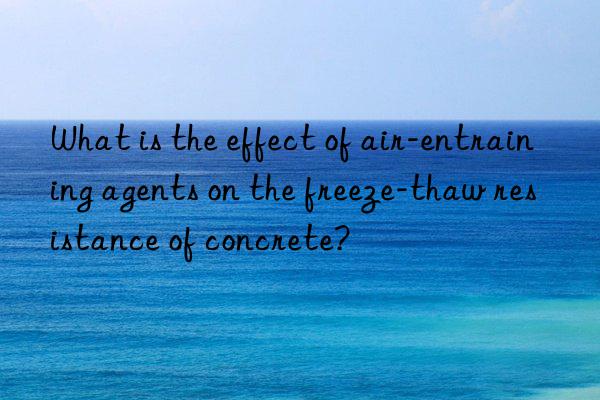
What is the impact of air-entraining agents on the freeze-thaw resistance of concrete?
Among concrete materials, air-entraining agents have the greatest and most significant impact on frost resistance. Many engineering practices have proven that the freeze-thaw resistance of concrete mixed with air-entraining agents has been greatly improved. The reason why air-entraining agents can improve the freeze-thaw resistance durability of concrete is mainly because air-entraining agents can introduce evenly distributed fine bubbles during the concrete mixing process. These bubbles in the hardened concrete can alleviate the problems caused by the freeze-thaw process. The ice expansion pressure and capillary penetration pressure improve the freeze-thaw resistance of concrete. If the average diameter of the bubbles introduced by the air-entraining agent is less than 20cm and the bubble spacing coefficient is 0.1~0.2mm, the frost resistance of hardened concrete can be 1~6 times higher than that of concrete without air-entraining agent.
The pores produced by the air-entraining agent are larger than the capillary pores. These pores have the function of storing supercooled water when the pressure is below freezing point. The pores provide space for the volume of cold water to expand when it freezes. Since the water in the pores of the cement slurry is alkaline, even at -10°C, only the water in the large pores freezes, while the water in the small pores remains supercooled. At the same time, the ice in the pores freezes. It is formed by pure water, which causes the alkali concentration of the unfrozen aqueous solution in the hole to increase, forming an alkali concentration gradient, which in turn forms osmotic pressure, causing potential damage to concrete.
What is the effect of air-entraining agents on the shrinkage and creep of concrete?
The shrinkage value of concrete depends on the amount of concrete mixing water. Under the same mix ratio conditions, air-entrained concrete will have a certain increase in drying shrinkage due to the introduction of a certain amount of bubbles. However, since the air-entraining agent can improve the workability of concrete, it can reduce mixing water, thereby reducing the impact of increased drying shrinkage due to air-entraining. Air-entraining agents in practical applications have little effect on concrete drying shrinkage. When the workability and strength are the same, the creep of air-entrained concrete and ordinary concrete are basically the same.
</p



 微信扫一扫打赏
微信扫一扫打赏
